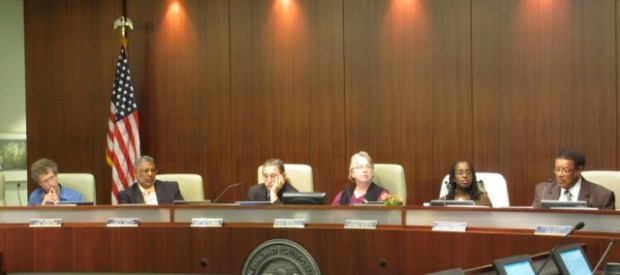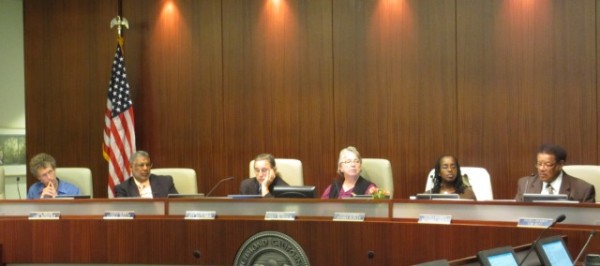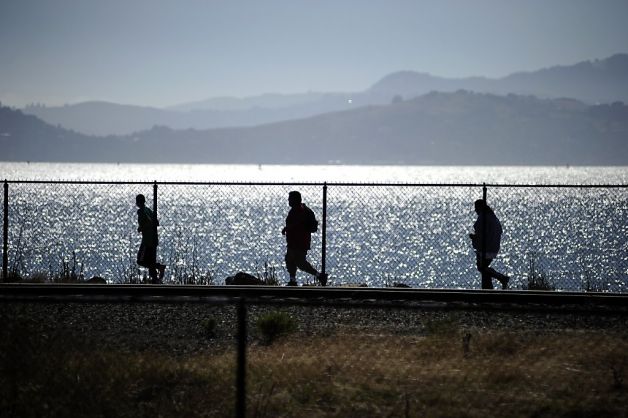|
|
Richmond council approves funding to re-open Point Molate, close Bay Trail gaps

City Council members decided on a number of key expenditures before their recess until September 11.
By: Jennifer Baires | August 1, 2012 – 6:22 pm
On Tuesday night, at the last city council meeting before a month-long recess, the council wrapped up by approving nearly a dozen expenditure items, most notably the resurrection of Richmond’s only beach—Point Molate.
The Point Molate beach approval was part of the council’s decision on how to allocate the $669,000 settlement awarded to the city from the owner of the Cosco Busan tanker, which hit the Bay Bridge in 2007, causing over 50,000 gallons of fuel to spill in to the bay. According to the terms of the settlement, the money must be used to “implement appropriate restoration projects” along the Richmond edge of the bay.
Following the advice of the staff, the council allocated $489,000 of the settlement money to close two gaps in the San Francisco Bay Trail. The recently completed trail in the Rosie the Riveter/WWII Home Front National Historical Park will be connected with the trail that leads in to the Miller/Knox Regional Shoreline Park, and the 0.16-mile gap along Garrard Boulevard between Cutting Boulevard and the Ferry Point Tunnel will also be closed.
Councilmembers Tom Butt and Corky Booze debated how best to spend the remaining money at Point Molate. Butt motioned for $154,000 to rehabilitate and re-open the beach. The park closed in 2004 due to budget constraints.
Booze wanted some of the funds to go towards creating a railing for the pier at Point Molate, in the hopes it would allow fisherman to fish safely in the area. Councilmember Nat Bates agreed with Booze’s amended motion. “There’s enough money to go around,” said Bates.
The final motion put the money towards re-opening the beach and set aside the balance of the funding—roughly $26,000—for a safety railing on the pier.
“Let the record reflect this is a new year,” Bates chuckled after the council unanimously approved the allocation of the money, referring to the contrast between Tuesday night’s meeting and other, more contentious, recent council meetings.
Many members of the public spoke before the final vote and expressed excitement for the return of Point Molate. “I can’t think of family who, given the chance, wouldn’t go to Point Molate,” said Richmond resident David Helber.
The other large appropriation vote for the night was for a five-year commitment of $375,000 annually to the Richmond Art Center (RAC). The RAC is a non-profit community organization founded in 1936; it helps children in Richmond engage with art and offers some need-based scholarships so that children can participate in its programs. According to its website, this year was a particularly hard one for fundraising and the center received large cuts to many of their grants.
The RAC item had the most public speakers signed up to comment, and many stayed late for a chance to speak. “As a teen, the art center helped me. By supporting the art center you are supporting the youth within Richmond. The arts have quantifiable and tangible relations to preventing violence within our communities,” said Gerard Gutierrez, a member of the Richmond Art Center board.
Reverend Wesley Ellis said he was conflicted on whether or not the arts should receive so much money from the city. “Over a five year period you will spend over $1 million,” he said. Given the state of Richmond’s finances and some of the pressing problems in the city, Ellis said, he wasn’t sure if this was the best way to spend the money.
The council unanimously approved granting the funding.
In other business, councilmembers approved giving $45,000 to the Office of Neighborhood safety to cover costs for administering a grant for expanding the Native American Health Center in Richmond to better serve children and their families who suffer from serious mental health conditions. By a vote of 6 to 1—with Booze opposed—the council approved amendment of the city’s municipal code to allow citizens to keep and store one vehicle per parcel that is mechanically operable, but has a specific DMV non-operable status that makes it illegal to operate on a public street.
Mayor Gayle McLaughlin ended the meeting on a bittersweet note that recalled the tension of the last few meetings. “Some time away from these meetings, I think, will do everyone a world of good. Please enjoy the break and I’ll see everyone in September,” she said.
Richmond Art Center gets major funding commitment from city
By Robert Rogers
Contra Costa Times
Posted: 08/01/2012 01:59:55 PM PDT
Updated: 08/02/2012 06:28:29 AM PDT
RICHMOND -- A unanimous City Council on Tuesday voted to give the Richmond Art Center up to $375,000 annually over the next five years.
The funding is contingent on a memorandum of understanding between the city and the nonprofit center to provide a host of new art programs and classes in local schools, libraries and community centers.
The funding infusion comes at a crucial time for the center, which has been offering programs and exhibits since the 1930s.
"Like other art nonprofits, (the center has) experienced a significant decrease in funding from the private sector, and has been without a full-time executive director since December 2011," according to a staff report. "The RAC is seeking city assistance to help with the transition to a new executive director, and to provide stability while the new programs are set in place."
Despite the fiscal pressures, the art center has become better integrated into city services and sites, the report states, noting, "its board has responded with renewed educational programming in community centers, schools and the library."
The city will provide the center $275,000 annually for general operations funding. As part of the memorandum of understanding, the largest portion of the funding will go toward providing arts programming at Lincoln Elementary and Holmes Middle School, Shields Reid Community Center, as well as in Richmond public libraries and at other community centers.
The remaining $100,000 will be given to the center only to match grants and other funds it manages to secure, either from foundations or individual donors, in amounts of at least $1,000.
The Richmond Art Center has been part of the Richmond Civic Center since it was built in 1951. In addition to the funding support, the city provides the center with free space at 2540 Barrett Ave.
The center hosts classes in painting, ceramics, jewelry making, weaving, screen printing, and children's art, and operates a summer program for youths.
Some speakers Tuesday raised concerns about the expenditure, given the city's ongoing fiscal troubles -- Richmond is looking to close a $2.9 million budget deficit without layoffs -- but the majority of speakers praised the move.
Contact Robert Rogers at 510-262-2726. Follow him at Twitter.com/roberthrogers
|
Richmond's novel transportation program receives new funds
By Robert Rogers
Contra Costa Times
Posted: 08/01/2012 12:35:27 PM PDT
Updated: 08/01/2012 06:34:07 PM PDT
RICHMOND -- A fledgling alternative transportation program targeted at low-income residents has been awarded $343,000 in new grant funding, and residents and city leaders want to raise awareness about the program's availability.
The grant, accepted Tuesday by the City Council, comes from the Metropolitan Transportation Commission, which identified "Easy Go Richmond" as a program that helps ease congestion and improve air quality while providing improved transportation options for low-income communities.
"These are great programs, just amazing," Councilman Tom Butt said. "It helps take kids to school and after-school activities, takes people grocery shopping and recreation."
Officially launched in January, "Easy Go Richmond" combines fleets of electric and hybrid vehicles, charging stations, shuttles and bicycle sharing with online scheduling. Services include a "Kid's Cab" shuttle service and car sharing that allows drivers to rent electric and hybrid vehicles for just a few dollars.
The program has three locations with staff, electric cars and bicycles: Richmond Village and Monterey Pines, both low-income housing complexes, and Hilltop mall. Councilman Jim Rogers, an early proponent of the program, said it is funded by a $2 million grant from Chevron Corp. and a variety of transportation grants such as the one accepted Tuesday.
"The program is a full-court press to try to reduce carbon emissions," Rogers said, adding that the concept was developed by transportation researchers from UC Berkeley. "The second phase for us now is communication, outreach."
In accepting the grant, several residents and council members expressed concern with the lack of widespread public knowledge that the shuttles, electric cars and bicycles are available for residents.
"I work with a population that could really benefit from this program, and they don't know about it," said Councilwoman Jovanka Beckles.
Program administrators vowed to conduct more outreach and advertising to increase awareness of the program.
During an interview earlier this year, Rogers cautioned that the program would require patience and outreach to reach its potential.
"It's a complicated system with a lot of tweaking," Rogers said. "If it works, the implications are enormous, and there's no reason it shouldn't work all over the country, even the world."
Learn more about Easy Go at www.ci.richmond.ca.us/index.aspx?NID=2549.
Contact Robert Rogers at 510.262.2726. Follow him at Twitter.com/roberthrogers.
Richmond council approves funding to re-open Point Molate, close Bay Trail gaps

City Council members decided on a number of key expenditures before their recess until September 11.
On Tuesday night, at the last city council meeting before a month-long recess, the council wrapped up by approving nearly a dozen expenditure items, most notably the resurrection of Richmond’s only beach—Point Molate.
The Point Molate beach approval was part of the council’s decision on how to allocate the $669,000 settlement awarded to the city from the owner of the Cosco Busan tanker, which hit the Bay Bridge in 2007, causing over 50,000 gallons of fuel to spill in to the bay. According to the terms of the settlement, the money must be used to “implement appropriate restoration projects” along the Richmond edge of the bay.
Following the advice of the staff, the council allocated $489,000 of the settlement money to close two gaps in the San Francisco Bay Trail. The recently completed trail in the Rosie the Riveter/WWII Home Front National Historical Park will be connected with the trail that leads in to the Miller/Knox Regional Shoreline Park, and the 0.16-mile gap along Garrard Boulevard between Cutting Boulevard and the Ferry Point Tunnel will also be closed.
Jennifer Baires has the rest of the story at Richmond Confidential.
Richmond shoreline set for improvements
Carolyn Jones
Updated 07:39 a.m., Thursday, August 2, 2012
  1 of 5 1 of 5
View: Larger | Hide

Visitors run along the shore line at Miller/Knox Regional Shoreline Park on Wednesday.
Photo: Michael Short, Special To The Chronicle / SF |
Richmond's shoreline, one of the longest of any city in the Bay Area, will be a little greener and a little more accessible after two agencies voted to make major improvements along the formerly industrial waterfront.
The Richmond City Council and East Bay Regional Park District board agreed to spend a total of about $1.6 million on Bay Trail extensions, parks and wetlands restoration. With the Bay Trail improvements, bicyclists, hikers and other trail users will be able to travel a continuous, dedicated path from Albany to Point Pinole.
"The beneficiaries aren't just in Richmond. This will benefit the entire Bay Area," said Whitney Dotson, a park district board member and lifelong Richmond resident. "We've decided to make this a priority, and it's a beautiful thing."
The Richmond council agreed unanimously Tuesday to spend about $500,000 from the Cosco Busan oil spill litigation payout to fill two gaps in the Bay Trail totaling 0.73 miles. The gaps are near Point Richmond and Brickyard Cove.
The council also decided to spend $154,000 to reopen Point Molate Beach Park, which has been sitting dormant since the city closed it for financial reasons a decade ago. Until last year, the area was slated for a large casino and hotel, but is currently in limbo since the city scrapped the project.
"A lot of us would like to see some progress at Point Molate," said City Councilman Tom Butt. "It'd be nice to get some people out there, get the park reopened at least."
The city is still years away from seeing the original vision of the Bay Trail completed. The current configuration takes cyclists along the southern shoreline, past the port and Miller/Knox Regional Shoreline and through the tunnel in Point Richmond. But instead of traveling north along the Point Molate and Point San Pablo shorelines, the path takes a shortcut down the Richmond Parkway and eventually reconnects with the bay near Breuner Marsh, 218 acres of shoreline property just south of Point Pinole.
Bruce Beyaert, head of the Trails for Richmond Action Committee, said the biggest obstacle to bringing the Bay Trail through points Molate and San Pablo is money.
The major property owners in that area - Chevron and Caltrans - are agreeable to creating easements for the Bay Trail, Beyaert said. But coming up with at least $15 million for design and construction is a little more challenging, he said.
"We've already been at this for 13 years. But we're slowly making progress. We'll get there," he said. "It's worth it - the Bay Trail is for everyone. It's free. It's a wonderful asset for the whole region."
Meanwhile, the park district recently approved $1 million to restore Breuner Marsh. The project includes a 1 1/2-mile Bay Trail extension that links the Richmond Parkway with Point Pinole Regional Shoreline.
For Dotson, who grew up at Parchester Village next to the marsh, the move was especially gratifying. As a kid, he and his friends caught tadpoles and played in the wetland all the time, creating their own "personal environmental education class," he said.
But they had to crawl through a barbed wire fence to get there, he said.
Now residents of northwest Richmond, as well as the rest of the Bay Area, will be able to reach the shoreline and enjoy its attributes without hopping fences.
"Psychologically, it's very important for humans to have open spaces, even more than we realize," he said. "As far as I'm concerned, the more parks, the better."
Carolyn Jones is a San Francisco Chronicle staff writer. E-mail: carolynjones@sfchronicle.com |
|
|